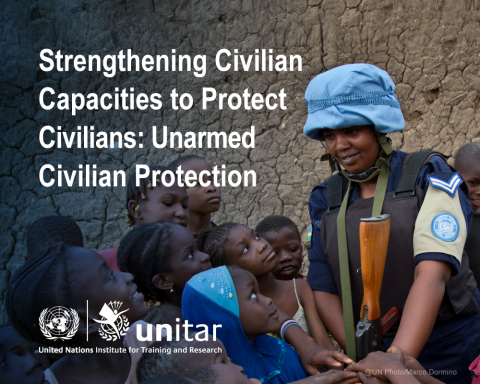
UNITAR Online Catalogue
Strengthening Civilian Capacities to Protect Civilians: Unarmed Civilian Protection [PTP.2020.14E]

Paix
NP
Arrière plan
According to the World Bank, more than 1.5 billion people live in countries affected by repeated violence. In absolute terms, the need for direct physical protection of civilians against imminent violence has never been greater than it is today. Local and international actors are struggling to protect all those under direct threat, wherever conflict occurs. A small number of civil society and humanitarian organizations have begun providing direct physical protection for civilians through a method called Unarmed Civilian Protection (UCP), which promotes nonviolent means for a community to protect itself from violence.
Objectifs de l'événement
The aim of this advocacy presentation is to raise awareness for and increase understanding of UCP. It starts by explaining the need for UCP, followed by an introduction to its key principles and methods, and finally describing how it fits into wider protection efforts and global discourses.
Objectifs d'apprentissage
By the end of this course, participants will be able to:
- Differentiate UCP from conventional peacekeeping;
- Place UCP in the history of nonviolence, protection and conventional peacekeeping;
- Define UCP and relevant terms linked to it;
- Describe the actors within UCP; and
- Locate UCP within key global discourses.
Contenu et structure
The course answers nine questions in sequence:
- Why do we need to protect civilians?
- Who has the responsibility to protect civilians?
- What is unarmed civilian protection?
- How does UCP work?
- Why does UCP work?
- How does UCP complement wider protection efforts?
- What are the strengths of UCP?
- How is UCP linked with key global discourses?
- What can you do?
The average work time is estimated at 1 hour.
Méthodologie
This advocacy course is a self-guided, self-paced, web-based course that is on-going and can be accessed at any time. The material is presented in text format with visual aids and web-based reference resources. Regular activities allow the participant to test their understanding of and reinforce the message of the course.
Audience visée
Primary audience: The course is designed for high level decision makers who can help shape global policy on Unarmed Civilian Protection, including diplomats, policy makers, politicians, donors, journalists, humanitarians, civil society and other human development leaders.
Secondary audience: The course is also geared towards students and any persons or groups with an interest in understanding and advocating for the better inclusion of Unarmed Civilian Protection into global peacekeeping efforts. Participants are not expected to have any prior experience or knowledge to take this course, other than:
- Having a good command of the English language (reading and writing);
- Being computer literate.
Informations supplémentaires
Technical Requirements
UNITAR recommends the following as a minimum in hardware and software to take our e-Learning courses. Please consult your Network Administrator or Systems person to ensure that you have the following:
Platform:
Windows 7 or superior;
MacOS 10.6 (Snow Leopard) or superior;
Linux.
Hardware:
Intel Core 2 Duo – or AMD – 3 GHz processor;
3 GB of RAM (4 GB recommended);
Hard drive: 160 GB minimum.
Software:
Adobe Acrobat Reader;
Adobe Flash Player.
Browser:
Google Chrome 30.0 or superior;
Mozilla Firefox 25.0 or superior;
Safari 7 or superior;
Microsoft Edge
Note that JavaScript, Cookies and Popups must be enabled
Mobile:
- Apple iOS in Apple iOS 10 or superior on iPad:
Articulate Mobile Player;
Moodle Mobile.
- Android OS in Android OS 4.1 or superior (optimized for tablets):
Articulate Mobile Player;
Moodle Mobile.
You will receive an email within 48 hours with the detailed information on how to proceed. Please kindly check your spam or junk inbox.